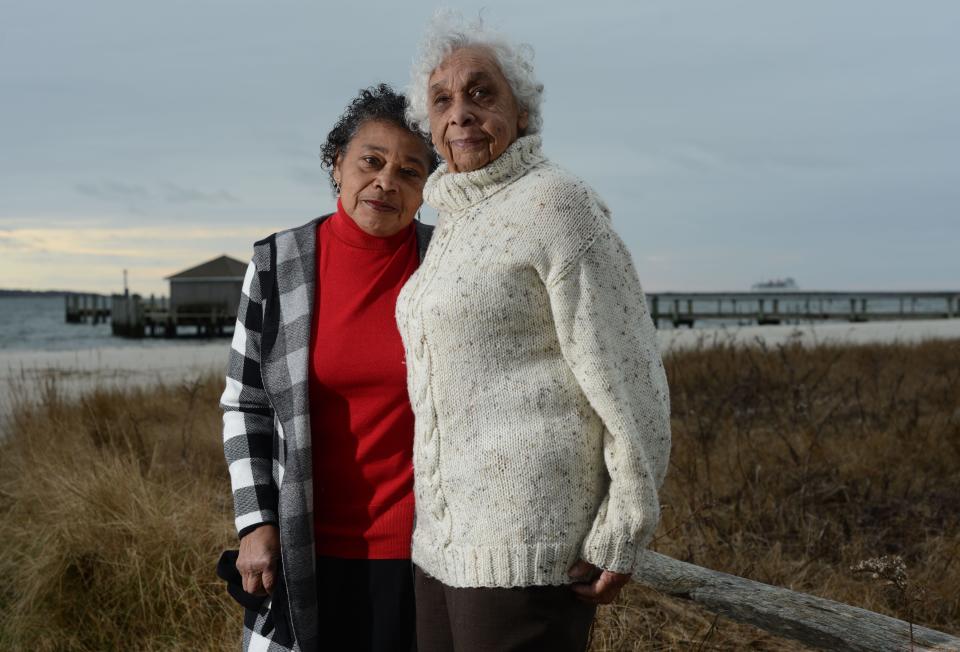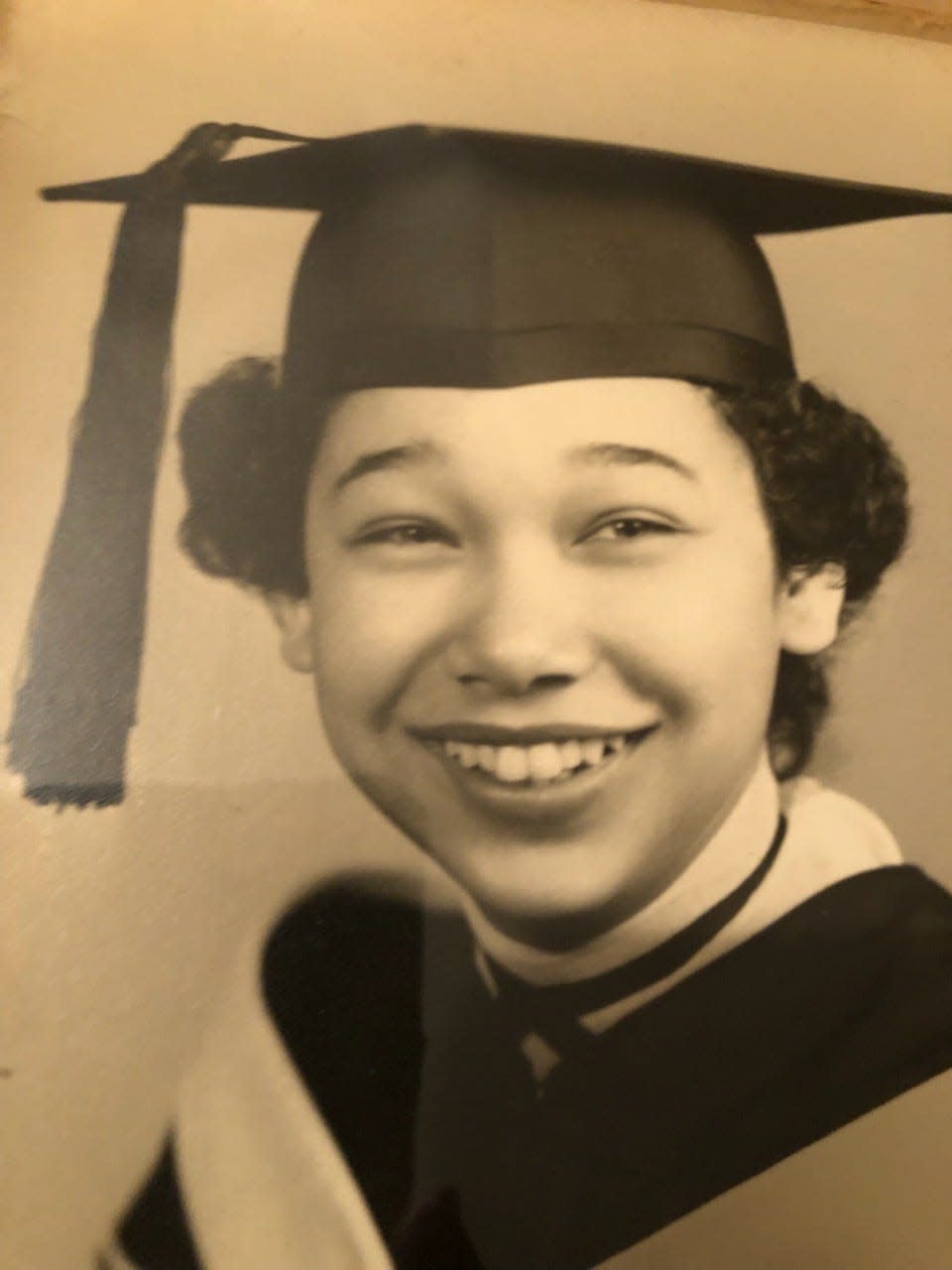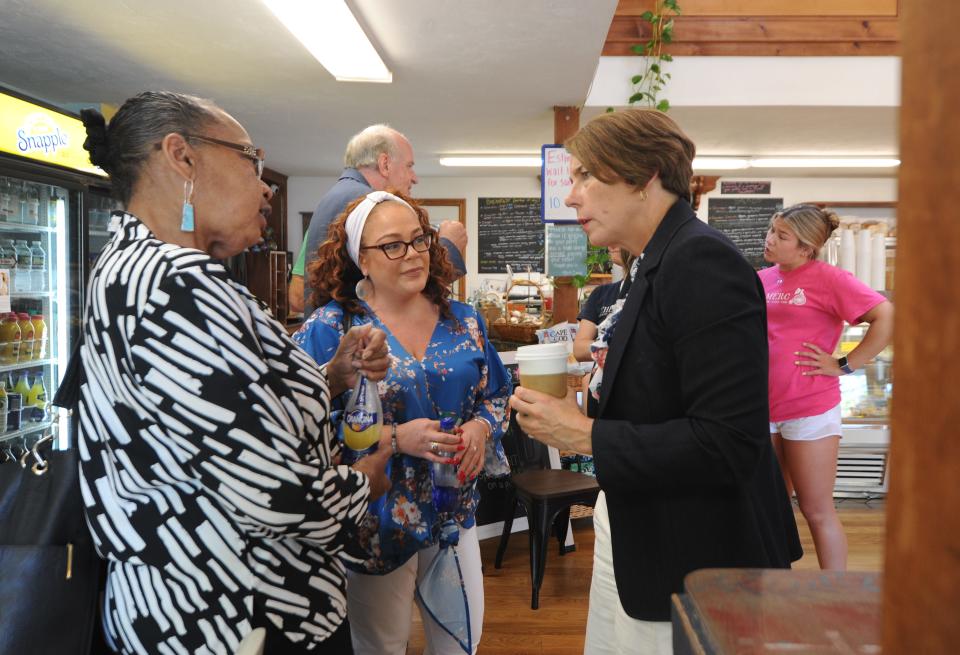On Cape Cod: Jeanne, Mary Morrison know frontline struggle for civil rights
- Oops!Something went wrong.Please try again later.
In the summer of 1949, Mary Morrison and a gaggle of her friends boarded a bus that was headed to what is now Joint Base Cape Cod for a teen dance.
But the bus driver told the girls of color that the bus, and the dance, was for the other group.
“We knew what the other group meant — even as teenagers,” said Morrison, 90. “The dances were segregated at that time, and we could only go with our own kind.”

With the holiday honoring Martin Luther King Jr. approaching, Morrison and her daughter Jeanne, 64, both of Hyannis, recently talked about their experiences on the frontlines of the civil rights struggles of the '40s, '50s and '60s during an interview on Wednesday with the Cape Cod Times.
Route 130 in Mashpee was once an undesirable part of town, Mary Morrison says
Originally from Hyde Park, Mary Morrison had spent every summer since she was nine at her mother Winnifred "Louise" Glover-Ellis-Hind's home in Mashpee. The house, off Route 130, was once a stagecoach stop.
At the time, Route 130 in Mashpee was considered an undesirable place to live, she said. Segregation was enforced town by town, by limiting areas where people of color could buy homes.
"Our neighborhood was filled with mostly Wampanoag, Cape Verdean, and a few outsiders from Cambridge and Boston," she said. "That’s the only place you could really live if you were Black."
After graduating from Anna Maria College in Paxton with a Bachelor of Arts in French in 1952, Morrison went on to Université Laval in Canada to obtain a Master of Arts in French, and graduated speaking Spanish, French and Latin in addition to English. With a desire to educate, she headed to Prairie View A & M University in Texas, a historically black college, where she was hired as a French and Spanish teacher.

Mary Morrison was accustomed to Northern segregation, but the explicit rules of engagement between whites and Blacks in the South in 1953 was eye-opening, she said.
"I hadn't witnessed prejudice like that before," she said.
A friend drinks from a whites-only water fountain in Texas
For Morrison, the water fountains for Blacks only were laughable. But, after her friend Vivian — a preacher's daughter from Indiana — took a long, cool, sip from the whites-only water fountain, she understood it was nothing to joke about.
"Vivian was kind of a wisecracking girl, and she was very outspoken," Morrison said. "She drank out of the whites-only fountain and someone slapped her because she did."
Morrison's experiences in Texas were unnerving and enraging, she said. But she met her future husband, George Morrison, at Prairie View. The couple, who would go on to have seven children, eventually tired of the South after George Morrison was accused of kidnapping, as the two were filling their car with gas. Morrison, who is Passamaquoddy and mixed race, was lighter than her darker skinned husband, who was originally from Texas.
The couple found their way to Mashpee in 1959, and later bought a house in a segregated neighborhood in Hyannis, where they raised their children.
'A touch of tar brush'
Legalized segregation held its grip on Black people in the South, but the North had a less obvious code and culture that supported racist systems, Mary Morrison said. If a person had a hint of color, it was important to walk the line.
"My mother used to say, if you had 'a touch of tar brush, you had to follow the rules,'” Morrison said.
George Morrison, who had earned a Bachelor's of Science degree at Prairie View, was the first Black man to work at the Cape Cod Times and New Bedford Standard-Times as a circulation manager, according to his daughter Jeanne. He was consistently passed over by white counterparts for promotions throughout his 10 years there, she said.
Dolores DaLuz is keynote speaker of Sunday MLK event
Eventually, George Morrison became a meat cutter for Shaw's supermarket. Morrison, who died in 2006 at 76, also became a Barnstable Police Department auxiliary officer, and he owned Honest George's Taxi.
Applying for jobs on Cape Cod
Despite a degree and the ability to speak four languages, Mary Morrison worked as a chambermaid. She worked for wealthy people in Osterville, including the Kennedys.
"Ethel couldn't have been nicer. She would greet you at the door and say thank you so much for the help," said Morrison. "A couple of times when I was at church she came and knelt down beside me."
Mary Morrison kept applying for teaching jobs and managed to land an interview at Barnstable High School. But when she appeared at the school, the principal at the time wouldn't hire her. Instead, he hired a white woman who had just graduated college, Morrison said.
"Barnstable High wasn't ready," she said.
Cape human rights awards focus on equity, access to healthcare
Eventually, she was hired at Nauset Regional Middle School by Dick Hoyt, who was head of the language department at the time. She was one of two multi-racial people at the school in September 1969.
One of her colleagues was Frank James, a Wampanoag and staunch supporter of Indian rights, she said.
Family car trips to the South
The Morrisons raised their children on Cape Cod, but often traveled to visit George Morrison's mother in Alto, Texas. As the family traveled by car and reached Southern states, Jeanne Morrison said her parents' energy changed.
"They were more serious. More fearful," she said.
Jeanne Morrison remembers Alto as a rural town, with the dirt so red the bottoms of the children's feet were stained orange.
There was also a stark, physical divide throughout the town, she said.
"All the colored people were on one side of the street and all the white people were on the other," she said.
Experiences of Black families in the South
In Alto, when George Morrison was a young boy, the Ku Klux Klan would grab a Black man every Friday night, and shoot at his feet for fun, Jeanne Morrison said.
"This was led by the sheriff's office. My grandmother showed me the building where they did it," she said.
George Morrison had two uncles who returned from World War I and wore their uniforms around town. "They were hung for being uppity," Jeanne Morrison said.

On one of the family trips from Boston to Alto, they stopped to buy ice cream in Mississippi.
“We came up to the window and the man said, 'I don’t serve (N-word),'" said Jeanne Morrison. “It just felt violent. My father got us in the car, and we kept going."
In Hyannis, at age nine, Jeanne Morrison had a similar experience as she rode her bike with her sister. They cut through a corner gas station, and two white men were gassing up a red Cadillac with a bumper sticker or decal that read "Southie," a nickname for a neighborhood of Boston. When the men spotted the two girls, the men hurled racial slurs.
The operator of the gas station "came flying out from the gas station, throwing stuff at them and cursing. They all had an altercation," Morrison said. "My sister and I just went into the garage bay and huddled in the corner. We were scared to death."
Change in the racial landscape was well-known to Morrison family
The Morrisons and their friends were keenly aware as the racial landscape changed.
Martin Luther King, Jr. joined lunch counter sit-ins in 1959 and then led a freedom walk of 125,000 people in Detroit in 1963. In 1963, King gave his "I Have a Dream speech" from the Lincoln Memorial in Washington before 250,000 people.
"The white people around us saw him as a troublemaker," Mary Morrison said. "We all looked at him as a hero."
The Morrisons joined the National Association for the Advancement of Colored People Cape Cod chapter, which was founded by local activists like Joe and Dolores DaLuz, Margaret Moseley and Eugenia Fortes. Throughout the years, said Jeanne Morrison, members discussed King's strategies, and Fortes organized marches on Main Street in Hyannis, and lunch counter sit-ins at Thompson's Drug Store.
Eugenia Fortes hosted Martin Luther King Jr. and others at her home in Harwich
To further support the movement, Fortes also hosted King, Thurgood Marshall and a young John Lewis at her home in Harwich, said Mary Morrison.
"They could just come here and rest," Morrison said. "No one knew where they were. They just hung out and felt safe here."
Fortes, who died in 2006, was also known for making two yearly trips to Mississippi to bring supplies to people living in poverty, said Jeanne Morrison.
"She was risking her life to bring love to people that didn’t have anything. That became a kind of freedom for her," Morrison said.
Jeanne Morrison grew up inspired by the advocacy going on around her, and by the time she entered high school she was already active in walks for peace, walks for hunger, food drives and served as a big sister to classmates with developmental disabilities and a child of color with a single parent..
"I stood on the shoulders of people like Joe, Eugenia, and my parents. They got pushed down in the mud, so to speak," said Morrison. "They never got to stand upright."
Boston bus desegregation crisis trickled down Cape
When Jeanne became a freshman at Barnstable High School, she took a deeper look into King's ideas. John Reed, a local activist and co-founder of the Zion Union Heritage Museum in Hyannis, was her African American history teacher and was instrumental in her growth as an activist, she said.
Reed was one of four Black teachers who were hired at Barnstable Public Schools in response to the fallout from the Boston desegregation busing crisis of 1974.
The Racial Imbalance Act, which aimed at eliminating racial imbalance within Boston Public Schools, passed in 1965, but wasn't enforced until 1974, said Jeanne Morrison. With more families — both white and Black — migrating to the Cape from urban areas at the time, rumbles broke out at school, forcing Barnstable school officials to segregate buses, Morrison said.
“They used to send the Black kids home first," she said. "Most of us were glad to get the hell out of there.”
Paying it forward
Jeanne Morrison is now a diversity, equity and inclusion consultant, but spent the bulk of her career as the assistant general manager of diversity and civil rights for the Massachusetts Bay Transportation Authority. She is also co-president of the League of Women Voters of the Cape Cod Area; political and civic leadership platform chair for the Massachusetts Women of Color Coalition; chairperson for Barnstable County Human Rights Advisory Commission; board president of Amplify POC; and an NAACP Cape Cod member.
As she continues to mentor young activists from the Cape area, Morrison said she tries to remember the lessons King preached throughout his lifetime.
"He was preaching from the mountaintop about brotherly love and acceptance," she said.
Not all have learned that lesson.
"It's hard to overcome things we don't understand," she said. "But Martin Luther King taught me that I need to love all people as much as I love myself. When we all learn that lesson, we will do better."
Staff writer Rachael Devaney can be reached at rdevaney@capecodonline.com. Rachael Devaney is a former member of Amplify POC.
Keep connected with the Cape. Download our free app.
This article originally appeared on Cape Cod Times: Cape Cod mother, daughter know the frontline struggle for civil rights

